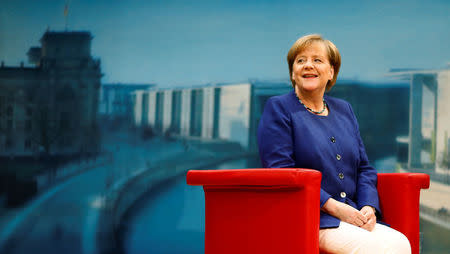Just as German election heats up, Merkel takes holiday break
By Erik Kirschbaum BERLIN (Reuters) – - With a comfortable lead in opinion polls, German Chancellor Angela Merkel has left the stage for a quiet three-week summer holiday shrouded in secrecy - even though just two months remain before the election. But her mid-campaign vacation - which local media say she will spend at the opera and in the Italian Alps - is less a reflection of her confidence she will win a fourth term or a natural human desire to recharge the batteries, and more a shrewd strategy to minimise the chances of any news that could swing the polls. The point is to tranquilise the electorate and signal to voters that she is above the political fray - and her timing is spot on, just when most Germans will taking a large portion of their six weeks' annual leave. Analysts note Germans cherish their holidays and will completely understand their leader taking time off too, even if the break happens to come just before the election – inconceivable as that may be in many other countries. "She's attempting to cool the whole campaign down by demonstratively taking a break and going on holiday in the middle of what has already been a dull campaign," said Nils Diederich, political scientist at Berlin's Free University. "She's sending a signal that she's above having to campaign for her re-election." Merkel's conservative Christian Democrats (CDU) and their Bavarian sister party, the Christian Social Union (CSU), hold a comfortable lead over her challenger Martin Schulz and his centre-left Social Democrats (SPD) ahead of the Sept. 24 vote. A poll on Friday by Electoral Research Group had the CDU/CSU winning 40 percent of the vote and the SPD 24 percent. If those polls are confirmed on election day, the CDU/CSU would have multiple possible coalition partners but the SPD just one. TIME TO TUNE OUT POLITICS "What voters like so much about Merkel is how she always stays calm," Manfred Guellner, managing director of the Forsa polling institute in Berlin. "They like her attitude that she 'is too busy running the government to go out and campaign'. Most Germans are on holiday themselves right now and the last thing they want to hear about is the election and issues," he said. Guellner added that Merkel was a master of a tactic known as "asymmetrical demobilisation", under which her party hopes that - after a campaign devoid of hot issues - more potential SPD voters stay home on election day than CDU/CSU voters. The SPD's Schulz has tried to step into the void and criticised Merkel for not addressing a rising tide of refugees arriving in fellow European Unions state Italy. Analysts said that approach would not help the SPD but rather perhaps only boost support for the far-right, anti-immigrant Alternative for Germany (AfD) party. A government spokesman declined to say exactly when and where Merkel would be on holiday. "The chancellor is always on duty," he said in an emailed response to a query. "She is always reachable, able to work and always kept informed on current events. But she will also take a few days to relax this year as well. Unfortunately, we can't provide any further details about the duration or location." Dieter Weirich, a columnist for the Frankfurter Neue Presse and a former senior figure in the CDU, said Merkel would win over German voters and their "harmony addiction" again. "She is presiding like a president above the party rivalries," Weirich wrote. "She wouldn't dream of upsetting voters with issues such as Turkey, the euro zone crisis, the G20 riots or energy policies." (Reporting by Erik Kirschbaum; Editing by Mark Heinrich)

 Yahoo News
Yahoo News 

